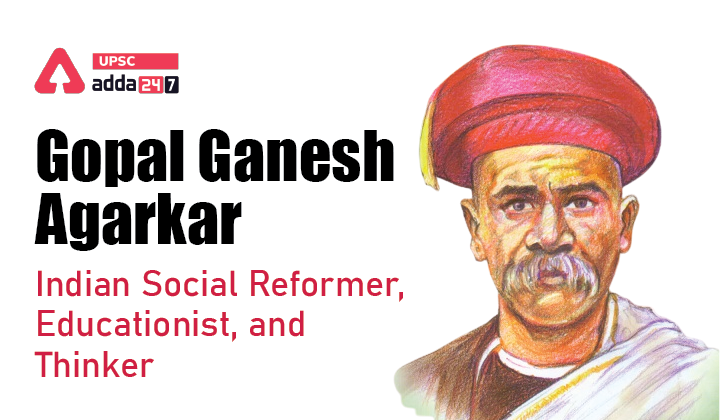Table of Contents
Gopal Ganesh Agarkar- Relevance for UPSC Exam
- GS Paper 1: Indian History- Modern Indian history from about the middle of the eighteenth century until the present- significant events, personalities, issues.
Gopal Ganesh Agarkar in News
- Recently, India celebrated the birth anniversary of Gopal Ganesh Agarkar, a modern Indian Social Reformer, Educationist, and Thinker.
Gopal Ganesh Agarkar
- About: Gopal Ganesh Agarkar was born on 14 July 1856 in Tembhu in Satara district of Maharashtra.
- Beliefs: Gopal Ganesh Agarkar was a proponent of rationalism, individualism, equality, and humanism.
- Gopal Ganesh Agarkar believed that education and the press could play a critical role in spreading these ideas.
- Social Reformer: social reform agendas of Agarkar included-
- Women liberation,
- Opposition to superstitious rituals,
- Removal of caste discrimination,
- Spread of scientific temperament &
- Promotion of education for both men and women
- Gopal Ganesh Agarkar was inspired from the Age of Enlightenment in Europe and the writings of Mill, Spencer, Voltaire and Rousseau which made him a proponent of scientific rationalism.
Gopal Ganesh Agarkar
- Against Caste System: Gopal Ganesh Agarkar was against various ill practices prevalent in the contemporary society.
- He started his periodical, Sudharak in 1887 in which he campaigned against the injustices of untouchability and the caste system.
- Promotion of women empowerment:
- Agarkar’s concern about women’s rights came from his childhood—he saw the suffering of his two widowed aunts.
- Mill’s Subjection of Women, which states that the standard of a given society is indicated by the position of women, was central to his advocacy for social reform.
- He also supported Widow Remarriage & fought for it.
- He lent support to Age of Consent Bill and Pandita Ramabai’s Widows’ Home in Puna.
- Promotion of Education: Gopal Ganesh Agarkar believed in the role of Education in empowerment of both women and men.
- Towards this objective, he along with Bal Gangadhar Tilak, established multiple educational institutions like the New English School, the Deccan Education Society, and Fergusson Collage.
- A Rationalist: Gopal Ganesh Agarkar believed in the power of reason in inducing people to overcome blind superstitious faiths.
- He believed in leading a life based on rationality & equality
- Gopal Ganesh Agarkar saw morality as distinct from religion.
Ideological Differences with Bal Gangadhar Tilak
- While Tilak’s “objected to any British interference”, which was based on his “pride in the Hindu Brahmanical tradition”, Agarkar was “influenced by Western intellectual tradition” and he did not have any qualms with British reforms in Indian society.
- Agarkar was also critical of orthodox practices in Hinduism. Tilak, on the other hand, did not like Agarkar’s sarcasm about Hinduism in Kesari.
- This ideological difference deepened with Agarkar’s argument for an urgent need to bring about social reform to address the plight of women and perils of caste hierarchy in India under the very aegis of British rule.
Raja Ram Mohan Roy- Indian Social Reformer
https://www.adda247.com/upsc-exam/raja-ram-mohan-roy-indian-social-reformer/





 TSPSC Group 1 Question Paper 2024, Downl...
TSPSC Group 1 Question Paper 2024, Downl...
 TSPSC Group 1 Answer key 2024 Out, Downl...
TSPSC Group 1 Answer key 2024 Out, Downl...
 UPSC Prelims 2024 Question Paper, Downlo...
UPSC Prelims 2024 Question Paper, Downlo...





